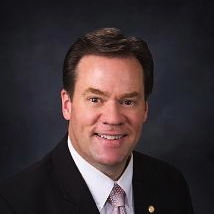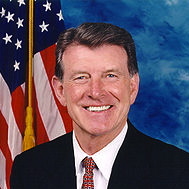(UPDATED, 6:47 p.m., with comments from Fulcher.)
State Sen. Russell Fulcher is positioning for a run for governor, and he has been outspoken about the state’s controversial health insurance exchange. He calls it Gov. Butch Otter’s “regrettable decision to voluntarily thrust Idaho into Obamacare.”

But when it comes to public education — which accounts for nearly one half of the state’s budget — Fulcher isn’t saying much, and he isn’t taking the fight to the incumbent. On Thursday, he said Otter’s 31-member education reform task force came up short on details, but offered a “reasonable” list of ideas.
Meanwhile, Fulcher’s voting record shows that he was in line with Otter on every major education issue of 2013.
Fulcher, R-Meridian, filed the paperwork Saturday for a possible gubernatorial run, naming a political treasurer. This is required in order to raise campaign funds — but it doesn’t mean Fulcher has decided to run. On his campaign website, Fulcher says he will spend the next two weeks traveling the state, “talking with folks from every county and community to listen and learn what people want from their governor.”
Fulcher, the Senate GOP’s majority caucus chairman, sits on the Senate Education Committee. But on Thursday, he indicated that education would not be his centerpiece issue.
“That’s probably not what I’m going to be leading with at this stage,” Fulcher told Idaho Education News.
Fulcher gave mixed reviews to the task force, which issued a far-ranging list of 20 recommendations. Otter has given the plan his initial approval, but has said it might take several years to implement the $350 million plan.
“The governor’s education task force, to me, was pretty short on detail,” Fulcher said.
However, Fulcher also said several of the task force’s ideas have merit — including a $253 million teacher salary ladder that would boost pay for new teachers and veteran teachers; a mastery system that promotes students based on command of subject matter; and a proposal to restore $82 million in school districts’ operational funding, which was cut during the recession.

Here’s a look at Fulcher’s voting record on education:
- In 2011, Fulcher voted for all three Students Come First bills — the Otter-supported education proposals that were rejected by voters in November 2012.
- After the November 2012 vote, Fulcher supported several bills that reinstated pieces of Proposition 1, the Students Come First collective bargaining law. This included one bill allowing school districts to cut teacher salaries and reduce contract days, and a bill requiring local teachers’ unions to demonstrate, at administrators’ request, that they represent at least half of a district’s staff. Both bills passed, over the objection of union leaders, and Otter signed them into law.
- Fulcher also supported a pair of 2013 bills to revamp charter school law: one proposal to provide charters with $1.4 million in building stipends; and a governance bill that allows universities to authorize charter schools and overhauls the state’s charter school commission. Otter signed both bills.
- Ultimately, Fulcher wound up voting for the $1.308 billion public schools budget for 2013-14, a 2.2 percent spending increase signed by Otter. But Fulcher did join a bloc of 18 senators, including Fulcher’s six fellow Republicans on the Education Committee, in defeating the first version of the budget. Opponents didn’t object to the bottom line — the $1.308 billion general fund figure remained unchanged throughout — but took issue with some of the “intent language” written into the bill. They said the language usurped the Education Committee’s policymaking role.
Fulcher has been a conservative vote on the Senate Education Committee. But compared to some of his more outspoken committee colleagues, Fulcher has played a relatively minor role on education issues.
Fulcher co-sponsored one education bill that passed in 2013. He worked with Boise Republican Sen. Clifford Bayer on a bill to eliminate a teacher early retirement program. This bill — also modeled after language from Proposition 1 — passed the Legislature, and Otter signed it into law.
